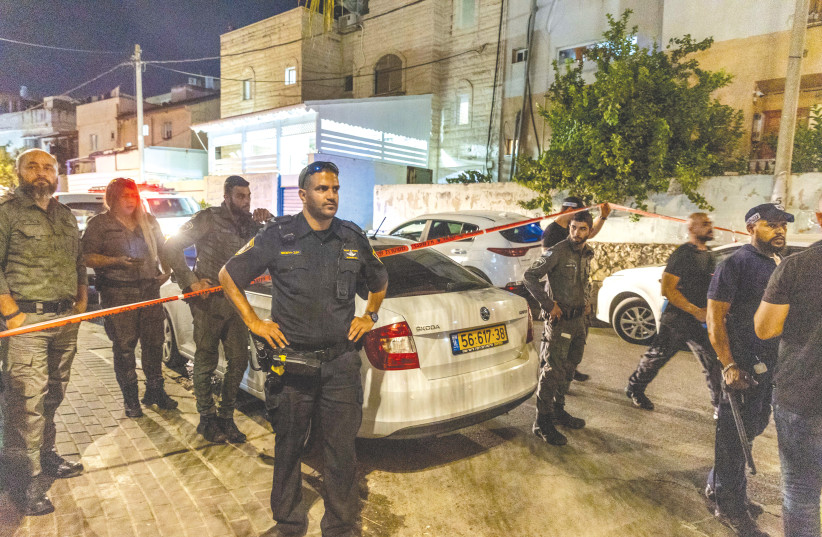Despite many positive aspects regarding Israeli society, one cannot possibly ignore the heavy shadow cast by the wave of violence which has washed over the country in recent years and entered almost every corner of every-day life.
Not one day goes by in which the citizens of Israel do not experience or hear about road-rage incidents. One cannot simply wave this issue aside, as a rare and insignificant phenomenon which only occurs in the periphery. Indeed, years ago, it occurred mainly in the southern periphery of the country, yet as every inappropriate manifestation, which is not properly dealt with, it widened and seeped into the heart of the Israeli mainstream.
Currently, only extreme violence is reported in the media and even then, it does not make the headlines, as violence on the roads has become an integral part of everyday life. This abominable trend of violence has also reached many schools throughout the country.
Violence is widespread throughout Israel
It began with a blatant lack of respect towards teachers, embodied in the very poor salaries which they receive. The empowerment of the pupils and their parents, who have become overly involved in the educational system, served to further diminish the authority of professional educators. This phenomenon is exacerbated by the lack of discipline, characteristic of many Israeli schools, and manifested in pupils feeling that physical violence is a legitimate means to reach certain ends.

We did not yet reach the stage in which a six-year-old boy shoots his own teacher, as was the case recently in the US, yet this extreme scenario may become a reality, if the current situation will not be controlled. When violent behavior is not checked and rules are not enforced, violence loses shame and becomes more frequent, more cheeky and more extreme.
That is exactly what had happened with the violence and crime in the Arab sector in Israel. A decade or two ago, it was a random and relatively rare occurrence, far away in the northern and southern periphery. If it was at all reported in the media, it was explained away as tribal tensions and mainly swept under the carpet and far from the public eye.
When I cried out on many occasions, including in the Knesset itself, about the fact that the nature of violence is to leek and seep into every corner of society if not properly checked and stopped, I encountered an astounding silence. Currently, extortions have already become a phenomenon that almost every small and medium-sized business in the county knows very well, including in the very center of Israel. The illegal weapons which are smuggled, bought and/or stolen, on an unimaginable scale, are sold to the highest bidder without much care for religion, color or ethnicity.
Such a complete disrespect for the law can no longer be explained away as simply tribal. It has become rampant and is present in everyday life: Farmers who suffer from theft, violence and vandalism from criminals and mothers who do not allow their daughters to walk out in the streets after dark in too many cities in Israel are but a few examples.
Yet more than anything else, one can no longer ignore the lack of respect which characterizes so many interactions in the Israeli public sphere recently and feeds the aforementioned violence. What once used to be the charming Israeli “chutzpah” has too often become an overt aggressive lack of respect for others.
It is not that there are not very many wonderful, polite, courteous and obliging Israelis. Oh, they certainly do still exist, yet the media enjoy hiding them and empowering those who are loud, aggressive and sensational in the negative sense! This is the hue that threatens to color the entire country and to affect the younger generation, which leans so heavily upon the social media.
This issue requires a clear directive from the senior leadership of the country and an official government decision which shall find expression in each and every ministry. The different ministers must include these messages in all of their speeches. Furthermore, wide and thorough educational program needs to be put in place by the Education Ministry and implemented from kindergarten age right up to the twelve grade.
Such a program must promote messages of mutual understanding, social cohesion and tolerance and needs to be implemented by the secular and religious schools, in all sectors, in the center and the periphery of the country.
Indeed, this is a wonderful opportunity for the Public Diplomacy Ministry, led by minister Galit Distal Atbaryan, to take upon itself relating the aforementioned messages to the Israeli public and promoting a truly significant and impactful agenda of mitigating the soaring violence via tolerance.
The writer, a former MK, was the founder and co-chair of the first Abraham Accords Caucus in the Knesset.
